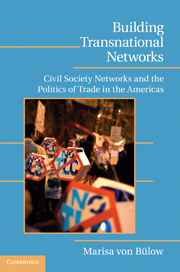Book contents
- Frontmatter
- Contents
- List of Figures
- List of Tables
- Acknowledgments
- Part One Civil Society Organizations and Their Pathways to Transnationality
- Part Two The Politicization of Trade
- Part Three The Dynamics of Networks
- Part Four Organizational Pathways to Transnationality
- Part Five The Search for Ideational Pathways
- 9 ALTERNATIVES FOR THE AMERICAS
- 10 TRANSNATIONAL COLLECTIVE ACTION IN DYNAMIC POLITICAL CONTEXTS
- 11 CONCLUSIONS: AGENCY, NETWORKS, AND COLLECTIVE ACTION
- Main Abbreviations Used
- Appendix A Lists of Interviews
- Appendix B Social Network Questionnaire (United States)
- Bibliography
- Index
9 - ALTERNATIVES FOR THE AMERICAS
Published online by Cambridge University Press: 05 October 2010
- Frontmatter
- Contents
- List of Figures
- List of Tables
- Acknowledgments
- Part One Civil Society Organizations and Their Pathways to Transnationality
- Part Two The Politicization of Trade
- Part Three The Dynamics of Networks
- Part Four Organizational Pathways to Transnationality
- Part Five The Search for Ideational Pathways
- 9 ALTERNATIVES FOR THE AMERICAS
- 10 TRANSNATIONAL COLLECTIVE ACTION IN DYNAMIC POLITICAL CONTEXTS
- 11 CONCLUSIONS: AGENCY, NETWORKS, AND COLLECTIVE ACTION
- Main Abbreviations Used
- Appendix A Lists of Interviews
- Appendix B Social Network Questionnaire (United States)
- Bibliography
- Index
Summary
Parliamentarians, government officials, the media, and civil society organizations (CSOs) often haven confronted challengers of trade agreements with the question: What do you propose instead? The pressure to present alternatives during negotiations is felt in domestic as well as in international fora. As this chapter will show, challengers of trade agreements have struggled to design proposals, but have done so through very different ideational pathways. Given the ideological heterogeneity and the organizational fragmentation among challengers of trade agreements, analyzed in the previous chapters, this is not surprising. Furthermore, considering that since the beginning of the 1990s debates about international trade policy making in the Americas have tended to become more and more polarized, with shrinking ground for agreement between supporters and challengers of new free trade negotiations, it has been easier for CSOs to coalesce around the opposition to specific negotiations.
At the beginning of the 1990s, CSOs that challenged the North American Free Trade Agreement (NAFTA) did make an effort to present a variety of alternative proposals. The founders of the Mexican Action Network on Free Trade (RMALC) carefully named the coalition to avoid presenting itself simply as anti-trade or anti-NAFTA. Instead, they called for the opening of channels of dialogue and denounced the lack of transparency in the negotiations. They organized numerous events to debate alternatives and proposals.
- Type
- Chapter
- Information
- Building Transnational NetworksCivil Society and the Politics of Trade in the Americas, pp. 155 - 175Publisher: Cambridge University PressPrint publication year: 2010

